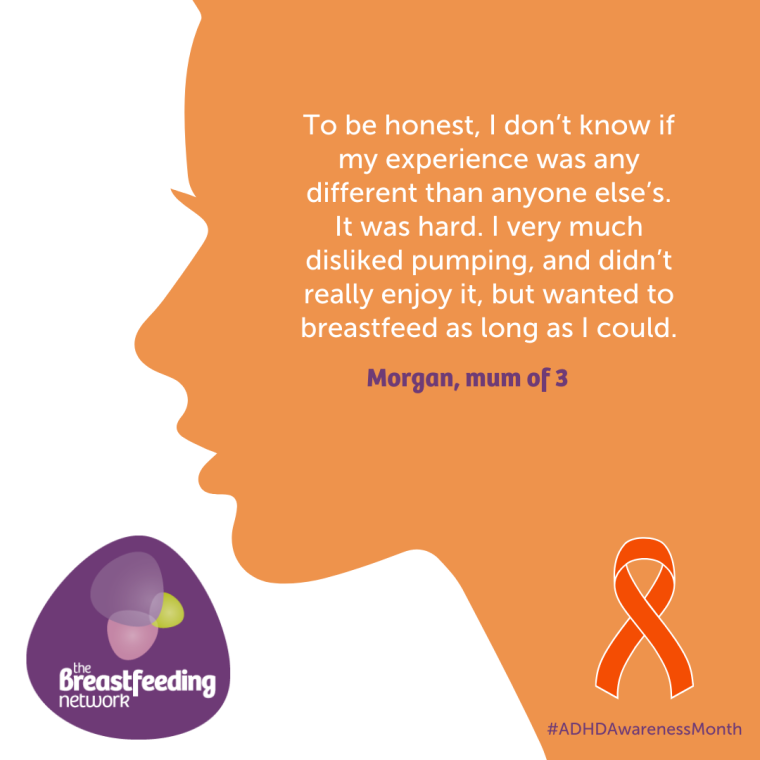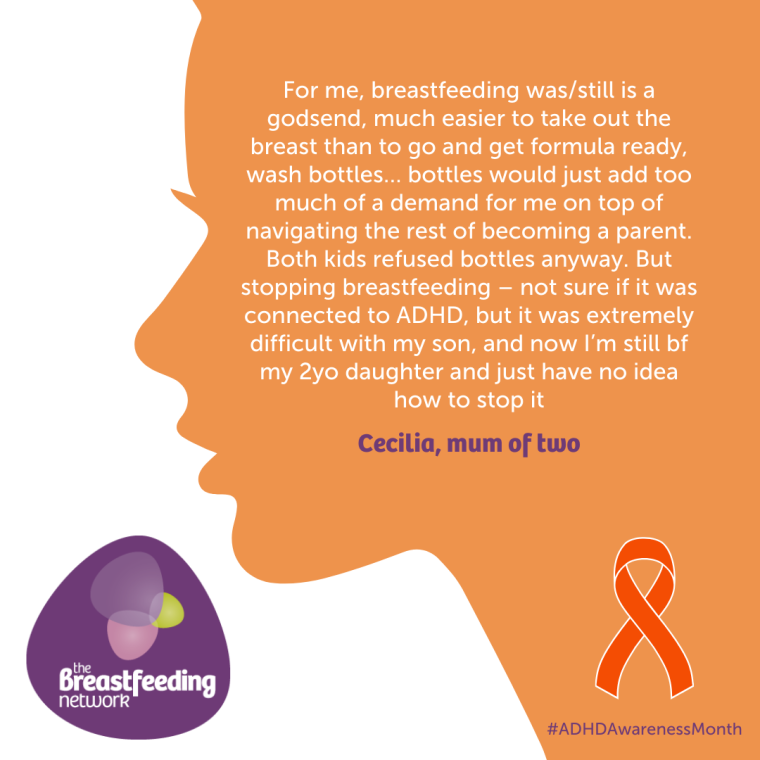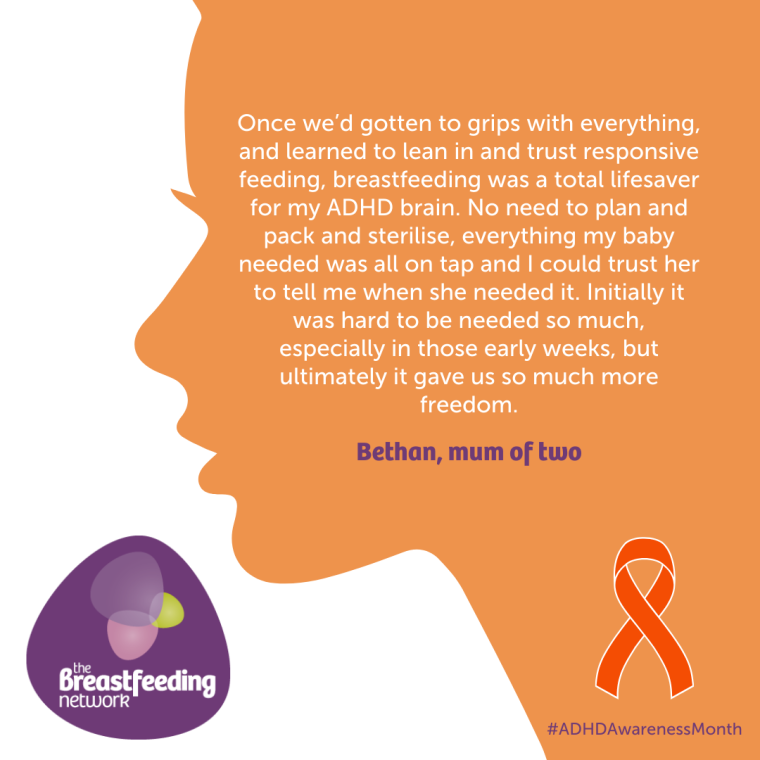I’m Emily, mum of two and an IBCLC and a Peer Supporter with the Breastfeeding Network.
For ADHD awareness month I’m writing about ADHD and how it affects parenting and breastfeeding. As an ADHD mum to a child with ADHD, I’ll share some of my own story and some experiences of others too.
What is ADHD?
ADHD (Attention Deficit Hyperactivity Disorder) is a neurodevelopmental condition that affects how the brain develops, how it processes and responds to information, and how a person feels and behaves. People with ADHD experience a range of difficulties relating to self-regulation (managing emotions, hyperactivity and impulsiveness) and executive function (concentrating and focussing, organisation and planning, memory).
ADHD was originally classified as a psychiatric condition and it is still diagnosed by assessing long-term behavioural (rather than physical) symptoms. However, it is now well established that ADHD has a strong genetic component and is associated with differences in brain structure and chemistry.

New research is also showing links between other physical conditions and ADHD, including how hormones and ADHD affect each other. Pregnancy, birth, and breastfeeding have a big impact on hormones – and women with ADHD seem to be more sensitive to these normal hormone changes. They are also at higher risk of certain medical complications around pregnancy and birth.
ADHD symptoms may be made better or worse by changing hormone levels and changes to normal lifestyle and routines. Having a baby does a lot of both! If you have ADHD and are pregnant or breastfeeding, you may find that you need extra help managing your symptoms, or to review previous strategies that are no longer working.
Postnatal Mental Health
As well as worsening ADHD symptoms, women with ADHD are at higher risk of mental health conditions such as OCD or Postnatal Depression (PND). Having a strong support network in place can help you navigate any difficult feelings and identify any new or worsening symptoms as early as possible.
Find out about local support for ADHD, parenting and mental health in your area so you know where to go for extra help if needed. You may be offered extra support through your midwife or GP, and there are many services run through the Start for Life Programme that may be able to offer practical and emotional help though support groups, counselling or parenting classes.
ADHD Medication and Breastfeeding
If you would usually take medication for your ADHD or mental health, you may have already discussed with your doctor whether you needed to change this during your pregnancy. It is important to have this conversation again in relation to breastfeeding.
You may be concerned about possible effects of medication on your baby, however, it’s important to weigh up the risks of taking medication against the impact of your symptoms returning or getting worse. Your doctor or pharmacist can discuss with you which medications for ADHD are compatible with breastfeeding, and how to restart them if you stopped taking them during pregnancy. You can also contact the Breastfeeding Network Drugs in Breastmilk service for information.
It’s essential that you speak with your doctor before making any changes or stopping your medication. They will be able to help you to weigh the risks and benefits, make a plan for any changes and monitor you throughout.
Breastfeeding When You Have ADHD
A common theme when I’ve heard from women with ADHD is that, if everything’s going well, responsive breastfeeding makes their lives so much simpler and easier. There’s no extra equipment to manage or clean and nothing to remember; your baby will simply tell you when they need to feed.
However, whilst it’s a natural process, learning to breastfeed takes practice, patience and persistence. From trying to learn a new skill whilst struggling with memory and strong emotions, to the practicalities of positioning and coordination just to get your baby latched when you’re recovering from a difficult birth. When you have ADHD there are aspects of breastfeeding where you may be more likely to experience difficulties.

Many people find feeding in the first few days after birth quite challenging and wish they’d had more knowledge in advance. It’s worth taking an antenatal breastfeeding class (most midwifery services offer them in person or online) and getting familiar with what support is available in your area. This can make it easier to access if you do find you need extra help with breastfeeding. Most breastfeeding support groups are happy for you to visit while you’re pregnant to help you learn the basics and get an idea of what it might be like.
You can find information on our National Breastfeeding Helpline and local peer support services here.
Breastfeeding a Child with ADHD
It is not possible to diagnose someone with ADHD until the symptoms are shown to be long-term, ongoing difficulties related to ADHD and not a normal developmental stage, or another cause or condition.
All babies need intensive care and support, regular feeding, changing and reassurance day and night. Sometimes expectations do not match with the realities of a baby’s normal cognitive, emotional and sleep development. Looking after any baby is difficult, especially in the early weeks, but it is important not to view normal baby and toddler behaviour as a clinical problem.
Whilst ADHD cannot be diagnosed in babies, research shows that babies who are later diagnosed with ADHD – or other neurodiverse conditions such as Autism – are more likely to show early signs that point towards later symptoms. There may also be a different level of difficulty or intensity associated with what might otherwise be normal behaviour.
For example, a baby or toddler later diagnosed with ADHD may be more likely to:
- Be described as ‘fussy’, ‘difficult’, ‘high needs’ or ‘highly sensitive’.
- Need more help regulating themselves (e.g. need more reassurance or contact with their parent, struggle with ‘transitions’ or to calm down even when comforted)
- Show differences or difficulties in sleep
- Experience sensory stimulation differently (e.g. be more or less sensitive/reactive than others the same age, or they may seek or avoid sensory stimulation more intensely)
- Experience developmental delays or differences in one or more areas
- Be diagnosed with an allergy
- Have stomach or digestive problems
Again, all of these can be observed in babies who are not later diagnosed with ADHD.
Research also shows that children diagnosed with ADHD tend to have been breastfed less than those who don’t. How breastfeeding and ADHD impact each other is, however, still unclear and more research is needed to understand the complex factors involved.
Supporting Breastfeeding and ADHD

Regardless of whether mum or baby or both have ADHD, all the normal advice for breastfeeding still applies in the same way.
It can be useful to also keep in mind that a mum with ADHD may struggle to process or remember information as easily as others, she may be struggling with more intense emotional or mental health symptoms, and her baby may also be more reactive or seem more ‘sensitive’.
Practical Tips for helping a ‘sensitive’ baby and/or ADHD parent
- Consider the environment and the sensory input both mum and baby are experiencing. How bright or noisy is it? Is the temperature comfortable? Is there anything you can do to make things calmer and less stimulating or distracting? Dimming lighting, being away from other people, and making everything feel quiet, cosy and safe may help.
- On the flip side, some babies may need constant stimulation to help them calm. They may respond to touch (stroking, patting or swaddling) or sound (gently speaking or singing, or a familiar background music or noise) or something else that works for that particular child.
- -Skin-to-skin contact helps the release of oxytocin which can help both mum and baby feel calmer and more connected, whether they’re feeding or not. Breastfeeding may be more successful with skin-to-skin, especially in the early days.
- Focus on getting a solid, stable base; good comfortable posture for mum, good alignment for baby, and plenty of secure support from pillows and cushions. People with ADHD are more likely to have hypermobile joints and may find sitting in one position uncomfortable. Listen to how it feels and be open-minded about what might work.
- Try different teaching or learning approaches, with resources to aid memory. Written information, voice notes and links to videos can all be helpful, or taking (with permission) photos or a video of mum and baby to show what’s worked for them and make it easier to replicate by themselves.
Sources
https://www.nhs.uk/conditions/attention-deficit-hyperactivity-disorder-adhd
Annual Research Review: Attention-deficit/hyperactivity disorder in girls and women: underrepresentation, longitudinal processes, and key directions – PubMed (nih.gov)
Perinatal Outcomes of Women Diagnosed with Attention-Deficit/Hyperactivity Disorder: An Australian Population-Based Cohort Study (springer.com)
https://link.springer.com/article/10.1007/s00787-019-01298-5
My Experiences of Breastfeeding and ADHD
I had my son when I was 21 years old. At the time, I didn’t know that we both have ADHD. Looking back, there were so many signs of ADHD in both of us, and I do wonder how things might have been different if we’d have known earlier. It was my son who was diagnosed first, age 7, and many more years before it all finally clicked into place for me too.
My life was chaotic and the pregnancy unplanned but, somehow, having a baby centred me and brought a level of calm and focus. In a world that felt complicated with constant confusing demands from all directions, his needs were simple and needed no justification. On a deep level, he just made sense to me, and in becoming a mother suddenly my distressingly hormonal and ‘over-sensitive’ body with a brain that thrived under pressure made sense too. I also think my age and lack of previous planning or expectations helped me to adjust to motherhood both physically and emotionally.
That doesn’t mean that it was easy! My waters broke the day I moved house, the birth was long and physically traumatic and I had therapy for Post Natal Depression when he was 2 months old. I was a single mum and full-time student whose life was out of sync with everyone around me. But I know that it would have been so much more difficult 10 years later (at an age when most in the UK are now starting their families) after years of trying to compensate for my undiagnosed ADHD had left me chronically burnt out and my mental health in tatters.
As a baby, my son was generally happy and content, provided he could feed on demand and had constant reassurance day and night. We co-slept, and if I couldn’t hold him for some reason (e.g. when driving or cooking) I had to talk or sing continuously to keep him calm. I was too chaotic to think too deeply about what he was ‘supposed’ to be like and I didn’t have close friends with kids to compare him to. Following his lead was much easier than not so I just did whatever seemed to work.
I actually felt I was very lucky with my first breastfeeding experience – my son clearly loved it, it didn’t really hurt and I had good supply. Yes, feeds were long and persistently frequent (at least 45 minutes every 2 hours for over 7 months) but I was young and I’ve always been good at napping.
In the very early weeks I even experienced a powerful euphoric feeling every time my milk let down. Like many women with ADHD, I’m extremely sensitive to hormone changes and this euphoria was likely caused by the surge of the ‘love’ hormone oxytocin that’s involved in the Milk Ejection Reflex (MER). It felt amazing; like a blissful wave that radiated through my body and brain, temporarily filling me with a lovely warm glow. Sometimes it was so intense and exhilarating it made me gasp. But everyone else just seemed to talk about the pain and stress of breastfeeding and for years I was too embarrassed to mention it. I rationalised it as my body’s way of helping me deal with post-natal pain (which has truth to it – oxytocin has been shown to reduce pain) and marvelled at how remarkable biology was. I now know other people experience a Euphoric MER too, but it doesn’t seem to be common and it’s definitely not widely shared!
From early on my son did vomit violently and regularly, but he otherwise seemed well and when I took him to A&E the Dr who saw us was so dismissive and exhibited such a lack of understanding of breastfeeding I was put off from seeking further advice. Teething was a nightmare involving weeks of sleepless nights, increased dribbling and vomiting and skin-blistering nappy rash for every single tooth. I didn’t realise when other people talked about ‘teething troubles’ that it wasn’t normally quite like that!
We stopped breastfeeding at 6 months (because in 2006 that’s what you did) and by then it felt like a relief. Transitioning to bottle-feeding didn’t change his behaviour at night and, now age 19, sleep is still an ongoing challenge for him. Looking back, I suspect he would have happily breastfed for many years and I wonder whether longer-term breastfeeding might have eased the severity of his teething or gastric symptoms. I’ll never know whether I could or would have carried on if I had the right information and support. But I was so touched-out and exhausted I just couldn’t imagine continuing.
My daughter and I, 4 years later, had a more difficult breastfeeding relationship. She was initially unable to latch and we persevered through awful pain and nipple trauma. I never experienced the euphoric let-down I’d had with my son and wept through many feeds in the first weeks. I worked out that she latched best when I laid her on a pillow on the dining table and sat on a chair in front of her, essentially presenting her to the breast to feed, but not actually touching her anywhere else.
Although we got past the initial difficulties, and learned to latch in more ‘standard’ positions, for me breastfeeding my daughter seemed much more ‘functional’ than with my son. Neither of us felt fully relaxed and on some level it always felt like she found it a chore. She liked to have something to hold while feeding, which helped her stay engaged in the feed, but she would repeatedly beat it against my chest. She loved the independence that came with baby-led weaning and by 12 months had self-weaned from the breast. I could tell she was ready, but I really wasn’t; I cried for days and suffered weeks of physical aches and pains as my supply dried up.
But later I realised that she hadn’t come to me for hugs, or fallen asleep in my arms until after we stopped breastfeeding. I think she weaned because, for her, breastfeeding was something out of her control and therefore out of her comfort zone. Her need to ‘do it myself’ has felt powerfully strong since day 1 (and was her mantra as a toddler); physical contact had to be on her terms, and that’s very much still the case 14 years later. She doesn’t have a diagnosis of ADHD but does show neuro-diverse symptoms and is being assessed for Autism.
With both my children breastfeeding had an intensity that, whilst often technically within ‘normal’ ranges, was definitely on the edges of that normal. Having two babies who were so different gave me a deep understanding that there’s (at least) two people involved in every breastfeeding relationship, and both are equally important.
It’s also helped me to feel less guilt for my own parenting as it was clear that, regardless of the choices I made, my children were always going to respond differently, growing and developing in their own unique ways. When you have ADHD there can be a lot of deep-rooted guilt and self-blame from all the negative feedback, failed expectations and fear of what you’ve passed to your kids. But there can also be a drive to ask questions, see a situation differently and keep trying new things. You can never know how your ADHD, parenting and life choices are going to impact your children long term, and it’s exhausting having a head buzzing with all the thoughts and questions while you desperately juggle the demands of life and parenthood. All you can do is to keep doing your best with the knowledge and resources you have, staying open minded and adapting as they grow to meet all the challenges along the way. Everyone needs support and it’s ok to ask for help.

